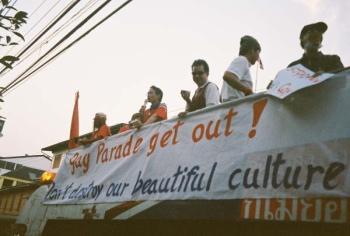In my opinion, Thailand is populated by some of the most polite, self-effacing and generous people. But that image was shattered indefinitely for me on February 21.
As I neared the corner on my way to Chiang Mai’s gay Pride celebrations, I saw them — a mass of people, wearing mostly red. Strange, I thought — it looked like a demonstration, but this was supposed to be the site of the city’s second Pride event.
My destination was the southwest corner, Buddha Sattan. It is a religious center that lies across from the Governor’s official residence, near the police station and the city’s Night Market shopping district. It’s a natural gathering site for parades because of its large parking lot.
As I arrived at the scene, what I saw could easily be described as hell on wheels. The place was packed with people shouting and waving placards. Two or three speakers were standing on top of vehicles, crying out hate against queers.
Protestors had effectively sealed Pride organizers inside the compound. Frenzied gay haters lined up on the walls, shouting abuse to roughly two dozen queers who had arrived to set up the event.
The scene was very different last year. Mplus, a Thai AIDS group, worked with the Human Rights Education Institute of Burma to co-host Northern Thailand’s first international queer conference. The International Lesbian and Gay Association came to town with a rallying cry to queers throughout Asia.
For four glorious days in January 2008, a queer canvas of Asia gathered: the first lesbian activist of Thailand, two Mongolian guys from Ultan Bator, a lovely trans Armenian and the first openly lesbian politician from Japan, among others.
We were a small group of 150 but considering where we came from, it was a remarkable achievement. A parade followed the conference, and it was a glorious small-scale event through the streets of the Night Market.
But as preparations for this year’s event began, walls started going up all around. Queer groups couldn’t agree how they wanted the parade to proceed. Chiang Mai was also reeling from the murder of a gay British expatriate. Conservatives were complaining about scantily-clad marchers, lewd behavior, gay monks and anti-Thai culture. Everything was thrown into the mix to stop this parade at all costs. Who was doing it?
Turns out it was some of our own. Some members of the Chiang Mai gay community felt left out of the parade organization, and they riled up traditionalists who were uncomfortable with gays and anything that disturbed the “golden image” of Thailand’s ancient culture. For some time it looked like the event was going to be cancelled. It was on again, off again as negotiations went on. The queer community went into overdrive, pulling out all the stops to save the event. They formed a coalition of 22 organizations from all over Thailand.
One outcome of that conclave was a statement by Mplus’ director Pongsathorn Chanluean: “Conservative groups in Chiang Mai have petitioned the Governor to ban the second Chiang Mai gay Pride parade planned for February 21, arguing that such an event undermines the city’s age-old culture. As director of Mplus, one of the event’s organizers, I believe that cultural heritage and the expression of sexual identities are not mutually exclusive.”
While not a strong statement by Western standards, this declaration created a groundswell of support. Things finally broke though a few days later, as queer groups came to agreement.
It looked like we were set to have a glorious parade. Folks from Pattaya, Bangkok and Phuket were on their way. What initially looked like a complete rout had seemed to turn into a great victory for Thai queers. But that was not to be.
Thailand is in the midst of momentous political and social changes. The goal of the group known as “the red shirts” is to topple the present government and perhaps reinstall their former prime minister, a convicted criminal.
The red shirts prepared for days leading up to the February 21 Pride event. They riled folks up about the supposed “demise” of the sacred Thai culture. One radio station screamed out for everyone “to come on down” to the Pride parade, and people called in to talk about weapons to bring along. The day before Pride, these folks travelled around tourist areas advising folks to not come down to the parade because there would be trouble. Saturday arrived and the red shirts converged.
This sad affair lasted four hours. The red shirts made three demands: stop the parade, promise never to hold another one and make an apology. On the spot and under pressure, Pride organizers gave in.
Shortly after, Pride organizers met and vowed to stage a small parade in a few weeks time just to show that “gays ain’t dead yet.”
However, the international fallout of this event, following so closely on the closures of the airport in Bangkok, could be shattering for the lifeblood of tourism in Thailand and Chiang Mai in particular. What does one say to queer travellers who want to visit Thailand? “Be gay, but don’t show us,” the protestors said. “We don’t care if you’re gay, but we just don’t want to see it.” Even in this paradise, the conservative hysteria around issues of sexuality runs deep.
Sadly, this city of dreams and culture has been tainted by hate and intolerance. Perhaps conservatives will consider that if a traditional culture needs to be protected through the use of hate and intimidation, perhaps it’s time for that culture to take a look at its roots and let in fresh blood and new ideas.

 Why you can trust Xtra
Why you can trust Xtra


